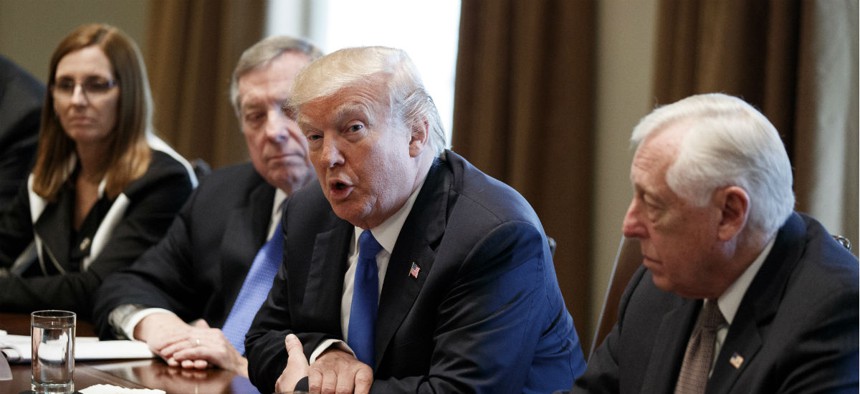Fearing ‘Breaking Point,’ Border Security Officials Press for More Pay and Manpower
Republican lawmakers pledge to support the requests.
Lawmakers and federal employee representatives at a congressional hearing Tuesday pushed for more manpower to enforce immigration laws and secure the border, saying financial incentives were needed to recruit and retain personnel for hard-to-fill positions.
A panel of the House Homeland Security Committee heard from four federal union leaders, three of whom represented Border Patrol agents. They noted the difficulties their members face and the growing number of employees retiring or fleeing for other law enforcement jobs that offer better pay and more stable hours. The employee advocates praised the Trump administration’s call for more staffing, but said convincing current employees to stay by offering higher pay was a prerequisite to any hiring efforts.
Brandon Judd, president of the National Border Patrol Council, one of the few federal employee unions to endorse Donald Trump during the presidential campaign, said the Border Patrol is not hiring quickly enough to keep pace with attrition, let alone meet the president’s call for a 5,000-agent surge. He bemoaned the numbers the administration put forward for the current fiscal year.
“The agents we hire this year will be halfway to retirement by the time we fulfill” the 5,000 Trump has called for, Judd said. Trump created that hiring mandate through an executive order he signed in January.
Other union officers said Customs and Border Protection was overly top heavy and that unfair pay disparities exist within CBP and at other federal law enforcement agencies. Exacerbating the attrition problem, they said, was a pay reform initiative signed by President Obama in 2015 that docked officers' and agents' overtime pay in exchange for more stable hours. The council supported the reform at the time, but said last-minute changes and its implementation have proved problematic. Morale at CBP, the officials said, has improved only marginally if at all, despite claims from the Trump administration that its leadership alone has boosted employees’ job satisfaction.
Judd, who has served as a Border Patrol agent for 20 years, made clear after the hearing that he has not lost faith in Trump.
“From a border security standpoint,” Judd said, “President Trump had done more than any other president I’ve ever seen.” He said his group is looking for the same sort of overtime pay that other CBP employees receive. Under the new law, most Border Patrol agents work 10-hour days and receive their normal pay as overtime. The agency compensates for unscheduled time worked in addition to those hours through compensatory paid leave.
Judd added he would be “disappointed” if Trump institutes a pay freeze in 2019, as the White House is currently planning, and would have to “understand why it is happening.”
Tony Reardon, president of the National Treasury Employees Union, was more forceful in his condemnation of the potential freeze.
“That is a non-starter,” Reardon said.
Rep. Will Hurd, R-Texas, a former CIA employee, said he understood where Reardon was coming from.
“Loud and clear,” Hurd said. He added after the hearing that a “broad generalization on policy is never a good thing.” Congress and the administration should focus on, “How do we make Border Patrol jobs competitive amongst all kinds of law enforcement, local and municipal law enforcement.”
Reardon and Hurd both pushed the Homeland Security Department to use existing incentives to boost retention efforts. CBP has received authority from the Office of Personnel Management to boost recruitment pay in certain areas, though it is still losing employees more quickly than it is hiring new ones. While the administration has largely focused on beefing up the Border Patrol and interior immigration enforcement agents, Reardon pressed lawmakers to support appropriations to hire at least 3,700 customs officers at the nation’s ports of entry. CBP has yet to bring on 1,200 of the employees it was funded to hire in 2014, and is still short an additional 2,500 employees it previously deemed necessary from its workforce planning estimates.
“Our officers are at a breaking point,” Reardon said. “If we’re going to be serious about security, and I think we should be, if we’re going to be serious about our economy, and I think we should be, then we need to hire the 3,700 officers.”
An omnibus spending bill for fiscal 2017 actually cut CBP workforce spending by $200 million, as the agency indicated to Congress it would hire 3,000 fewer agents than it initially projected. The DHS inspector general has estimated that based on current hiring and attrition rates, CBP would need 750,000 applicants to fill Trump’s order. It is, however, adjusting its polygraph exam, changing its physical fitness test and reforming its training process, factors that would affect the hiring rate. Agency leaders have said the average application processing time has decreased from 400 days in 2014 to 160 days today.
In October, the House passed the 2017 Border Security for America Act, which would authorize 5,000 new Border Patrol agents and an additional 5,000 customs officers. A recent Senate appropriations bill would not provide funding for any new customs officers. Hurd said after the hearing that he “absolutely” supported boosting customs personnel, adding that retaining existing employees was even more important as they are more effective than new, freshly trained recruits.
Rep. Martha McSally, R-Ariz., who chairs the Border and Maritime Security Subcommittee, left the hearing early to attend a bipartisan meeting on immigration with Trump at the White House. She said she would be “advocating for the agents and everything you need to secure the border.”




